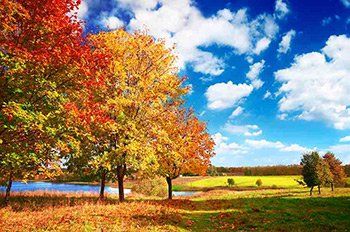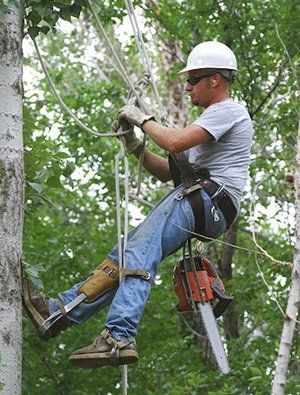Brilliant Fall Leaf Colors Are Not Just A Happy Accident
- By Author
- •
- 19 Sep, 2017
- •
Tuesday, September 19, 2017 10:41 AM
![Big Tree — Tree Removal in [[cms:structured_address_city]], [[cms:structured_address_state]]](https://lirp.cdn-website.com/9f059461ed9341f2a02010642f848b9e/dms3rep/multi/opt/image2594-1920w.jpg)
Trees are loved for their beauty as much as for their cool shade and protection from the wind. They are never more visually appealing than in the fall when their brilliant green leaves have changed to vivid shades of orange, red or yellow. These colors are part of a natural process that helps to keep the trees alive and healthy. The appearance of certain colors is not a random occurrence.
Why the Colors Change
Leaves change color because the tree is saving energy by no longer producing chlorophyll. A drop in temperatures is what causes this process to take place. Since sunlight is needed, and less is available during the winter months, it is sensible for the tree to relax and somewhat hibernate during this period of time.
When Red Leaves Appear
A sudden cold snap tends to make red leaves more common. However, the red color is mainly a protectant that absorbs the UV rays from the sun and allows the leaf to last longer. Leaves turn red because of Anthocyanins. These are molecules that are found in many types of plants and are what causes blueberries and raspberries and many flowers to have their red, blue and purple tones.
When Leaves Become Yellow
Leaves also have pigments known as carotenoids and this helps them to appear yellow or orange in the fall. This pigmentation is always present, but it is hidden due to the chlorophyll production in the spring and summer. Even though they are not visible most of the year, it is the carotenoids that help to keep leaves healthy during the growing season.
Why Leaf Colors Vary
Some trees have a high level of anthocyanins because of their species. A red oak or sumac will produce this molecule naturally and typically have very bright red or purple leaves in the fall. Trees that change into a combination of red, yellow and orange may do so because the leaves receive differing amounts of sunlight.
A tree with one side heavily exposed to sunlight during midday (when the light is strongest) may have more red leaves in that section than a section that gets less light due to being shaded by buildings or other trees.
Why Some Change Early
If the leaves of a tree are changing early in the season — before any cool temperatures and before other trees in the same area — it could be a sign of a problem. The leaf change occurs to protect the tree and the color change is a warning sign of some type of damage. It could mean the tree is not receiving enough water, has a bug infestation or is damaged in some other way.
Why Some Never Change
Evergreen trees are built for withstanding any weather. They have anti-freeze chemicals within their cells that keep them protected in even the coldest temperatures. The natural wax on pine and fir needles and other evergreens also gives them an additional layer of protection that keeps them safe even when they are encased in ice.
Landowners can do very little to control the temperatures their trees are exposed to through the summer and fall, but they do have some say over the other factors that determine the vibrancy of leaf color and when it appears. Trees that are properly watered and healthy will typically produce better colors and begin changing later in the fall.
Ensuring a picturesque landscape in the fall requires twelve months of tree care. Druid Tree Service is dedicated to providing that care in the most environmentally responsible manner possible. Contact us to arrange a yard inspection and to learn how a seasonal maintenance schedule could mean healthier, stronger and more beautiful trees all year long.
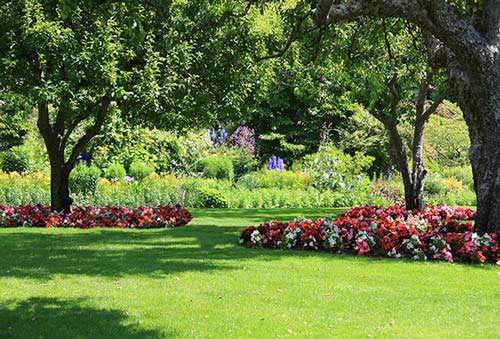
You value your shade trees for both their attractiveness in your landscape and the ample shade they bring your lawn in the warmer months. Caring for your shade trees allows them to grow to their healthiest potential.
There are many ways you can care for your shade trees so they provide the most shade and grow to their greatest heights without creating a disturbance in your yard. Here are ways you can maintain your shade trees so you can get the most out of their presence in your yard.
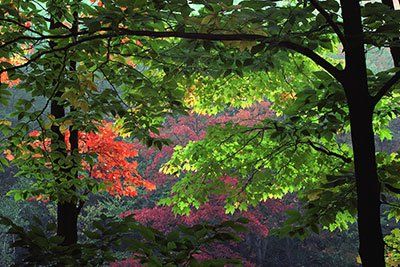
Druid Tree Service Inc. provides beneficial service to assist survey crews and planning drafters by providing expertise in tree management. As eco-consciousness grows among designers for urban and suburban civil engineering, nature is increasingly becoming a part of the planning. In previous years, developers would purchase large swaths of land and clear-cut the existing trees and plant life with the only oversight being soil erosion management.
Thankfully, times have changed and instead of eradicating the natural beauty of the property to be developed, the engineers and designers are utilizing the natural features and standing trees into the overall scope of the project. Tree management is now a valuable service we provide to the planners to map and detail the tree types, the terrain, plant life, and other information for protection and environmental compliance.
As a member of the American Society of Consulting Arborists, our professional insight is well respected in builder, legal, and ecological circles alike. Not only do we help save the natural environment, we also save money for developer and avoid legal problems as well. Druid Tree Service Inc. looks forward to meeting with you and helping you in any way we can, call us today!
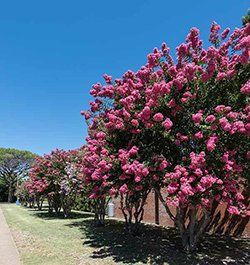
- Boxwoods – These dense shrubs are known for their evergreen foliage. Boxwoods can be pruned into elegant shapes to create dramatic hedges, but they also thrive with minimal trimming for a less formal look.
- Yews – If you like evergreens, yews are another great option. Available in many different varieties, they work equally well in shade or sun, and are drought- and insect-resistant.
- Crape myrtles – With their colorful flowers, crape myrtle trees add a splash of color to any summer garden. Although they are deciduous, their attractive bark can be an attractive focal point of the winter landscape as well.
- Hollies – Speaking of winter, holly bushes are sure to brighten up the gray, cold months. Their vivid red berries and shiny evergreen leaves make them a timeless favorite.

